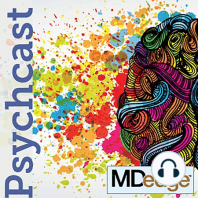7 min listen
Losing a patient to suicide with Dr. Nina Gutin
FromPsychcast
ratings:
Length:
39 minutes
Released:
Mar 11, 2020
Format:
Podcast episode
Description
Lorenzo Norris, MD, interviews Nina J. Gutin, PhD, a psychologist with a private practice in Pasadena, Calif., about losing patients and loved ones to suicide. Dr. Gutin wrote two evidence-based reviews on the topic late last year. The reviews were published in Current Psychiatry. * * * Take-home points When mental health clinicians lose a patient to suicide, the sequelae can include stigma, potential legal consequences, impact on future clinical work, and restraints on processing the loss because of confidentiality concerns. The American Association of Suicidology founded the Clinician Survivor Task Force (CSTF), which provides consultation, support, and education to mental health professionals to help them respond to the personal/professional loss from the suicide of a patient or loved one. Mental health institutions can benefit from protocols on how to respond to a potential completed suicide, so clinicians and families are not left in a vacuum of uncertainty and blame. After a patient suicide, clinicians need an anonymous or safe space to talk about the patient and the suicide without breaking confidentiality. This can be an online forum, such as the one sponsored by the CSTF, or an institution can identify a supportive colleague who has suffered a similar loss. The CSTF forum allows clinicians to remain anonymous. Summary Several domains require attention after the loss of a patient from suicide: Confidentiality restrains the ability to talk about the details of the loss, which stymies grief and learning from the event. Restraints of confidentiality pertain to individual clinicians and clinical teams. On a team, it might feel as if the clinicians are unable to process the loss as a group and talk about important details. Legally, clinicians worry about potential lawsuits, and “psychological autopsies” can lead to retraumatization. Clinicians might struggle with how – or whether – to talk to a patient’s family after suicide. Some lawyers advise compassion over caution. In collaboration with lawyers who advise what can be disclosed, a clinician can speak with a family, and this compassion toward families might decrease the risk of a lawsuit. Clinicians should be prepared for a patient suicide to affect their clinical work. A clinician might become hypervigilant about suicide risk and overreact, or they might experience denial about the risk and avoid asking questions about suicide. Ethically, suicide is an “occupational hazard” of working in the mental health field. Blaming clinicians for patient suicide hampers the depth of working with people with mental illness by causing some clinicians to avoid “high-risk” patients. The stigma around death by suicide extends to the survivors of the loss. When clinicians express vulnerability about loss, it can be interpreted as guilt. Clinicians are expected to keep going no matter what, which is unrealistic. Grief over a patient’s death should be neither pathologized nor shamed. Guilt and blame are the flip sides of each other; both express the complexity and ambiguity of these kinds of losses. Institutions should have “postvention” protocols in place to respond to the likely event of a completed suicide. Guidelines can address what needs to be covered in a review of the case while also supporting clinicians, so they don’t feel like it’s a tribunal. Clinicians should be warned of the normal sequelae of a client suicide, and institutions can make accommodations based on the expected impact of suicide on a clinician’s work. Institutions can provide support by connecting clinicians who have also lost clients to suicide to dispel the belief that they are alone in their loss and to mitigate self-blame. The CSTF provides support through in-person and online support groups, and postvention protocols for institutions. It also and maintains a bibliography of research on clinician survivorship. References Gutin NJ. “Losing a patient to suicide: What we know.” Current Psychiatry. 20
Released:
Mar 11, 2020
Format:
Podcast episode
Titles in the series (100)
Schizophrenia with Dr. Henry Nasrallah: Welcome to the MDedge Psychcast, the new podcast from Clinical Psychiatry News and Current Psychiatry. In this first episode, Lorenzo Norris, MD, talks with Henry A. Nasrallah, MD, about some of the etiology, presentation, and recent advances in... by Psychcast
